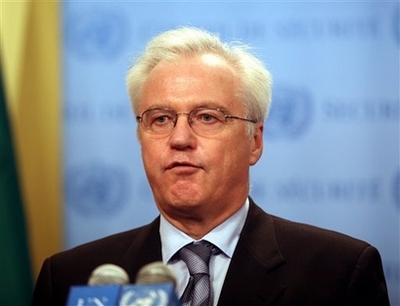IRAQ CATCH-22
Martin Walker, UPI’s chief international correspondent,* points to an interesting dilemma faced by the Coalition Provisional Authority in Iraq: vastly more troops are needed to properly police the area yet bringing in more troops from other countries would likely undermine the mission.
Consider the Balkans. In proportion to their populations, three times as many troops were deployed in Kosovo as in Iraq, and in Bosnia twice as many. By Kosovo standards, there ought to be more than half a million troops in Iraq. But maintaining 180,000 British and American troops in Iraq is putting intense strain on the military manpower of both countries. There is no serious prospect of their deploying any more. Reinforcement will have to come from other countries — and in far greater numbers than the 70 Ukrainian soldiers who flew in Sunday.
This is not impossible. India and Turkey have each said they are prepared to send considerable forces, divisions of 10,000-15,000 troops. Pakistan is also ready to contribute, and France even has some units training for a possible deployment to Iraq. But in each case these countries need the political cover and legitimacy that only a U.N. mandate can provide. And as World Bank President James Wolfensohn suggested during his recent visit to Iraq, the international financial agencies also want a U.N. mandate before they can contribute seriously to Iraq’s reconstruction.
So of all the grim questions now hanging like so many vultures over Iraq, the most urgent is whether the Bush administration is prepared to swallow its pride and go back to the United Nations for a new resolution on the reconstruction of Iraq.
The price to be paid for this would be considerable, and not just in loss of American face. Any hopes of a favored role for British and American oil companies would have to be reconsidered, and France and Russia might even see the honoring of those oilfield development contracts they negotiated with Saddam’s regime.
Above all, Washington would lose its current power to determine the political future of Iraq. The initial hopes that Iraq could become a prosperous pro-Western democracy, a catalyst for modernization throughout the Middle East, would become highly problematic. A political process supervised by the United Nations is likely to strengthen the hand of the Shiite majority, and may well help those Shiite religious leaders who take their cue (and their funds) from neighboring Iran. It would be hard for the United Nations to turn down the friendly offer from Iran of welfare missions and an accompanying 25,000 peacekeeping troops.
An Iraq in which the British and Americans no longer called the shots is likely to be far more welcoming — or vulnerable — to all sorts of Arab and Islamic “volunteers.” The outcome could well be the worst of all possible worlds for the Bush administration — an oil-rich Iraq that is closely linked to the ayatollahs of Tehran, while also proving a safe haven for al-Qaida and other Islamic extremists and militants. Such an Iraq would be the kind of regional menace that the United States and Britain went to war to prevent.
Indeed. Plus, the infusion of Turkish peacekeepers is a non-starter because of the Kurdish situation.
*Full disclosure: Walker is the editor of a forthcoming book on the Iraq War that I’ve signed for Brassey’s, Inc.






Which all comes back to the US/UK being put into its place by the “World Community,” which may well happen, especially depending upon how the American election begins to shape up. The downside is pointed out in that it would be far less likely that an Iraqi democracy could emerge and that Islamic extremists would have a far better chance to gain a favorable standing in such a scenario. Given all that, I would prefer the USA to pay the price of going it alone, or with what partners we can muster. This Terror War is a long term effort, akin to both the Cold War and a world war. It is far from clear that it is something that can be wrapped up in a single administration.
Uh, remind me again how the war on terror was served by the “battle of Iraq”?
From early on in the Terror War, it has been made abundantly clear that the war effort was against terrorism world wide, in all its many forms. Iraq’s former regime may or may not have provided any direct link to the attacks of 9/11 but it definitely was a state supporter of terrorism. Due to a number of circumstances, it was the most vulnerable of the state supporters of terrorism to a traditional military campaign. Iraq was a lot easier to defeat, and hopefully mend, than many of the other spots where we are going to make an effort in the near and distant future. Not all of the campaigns are going to be direct military interventions; for instance, I can’t forsee an American army in Northern Ireland, but surely the majority of the IRA have caught the hint by now. Other places, such as Columbia may have an increasingly large American military presence in the future. The vast majority of the world wide campaign is going to resemble the Cold War far more than a conventional world war. Iraq is just one piece that happens to be more of a conventional warfare type.
I’m beginning to think we may need some sort of a military auxilary. One with the ability to defend themselves if attacked but not soldiers per-se. People with nation-building specialties of various sorts to teach, rebuild, help out. But also ones that could walk around in military uniforms and make it look like there’s a lot more ‘presence’… 😉
I’d volunteer!
Leroy: Well, at least you’re honest about it. I’d actually agree with the reason if there wasn’t all the massive collateral damage to the very things needed to implement that strategic vision.
John, I can understand your point about the need to implement the strategic vision, for on that point, I fear the administration is falling a bit more than short. While we spend far more on our military than most all the rest of the noteworthy forces combined, we still do not have the warm well-trained bodies needed to do all the tasks that are ahead of us. In purely military terms, we are currently stretched to a near breaking point, regardless of what SecDef says. An outbreak of hostilities in the Korean pennisula would over-extend our forces quickly as an example. Beyond that, the USA has a fairly large amount of knowledge about how to fight and win land wars and the aftermath, but seems to be doing little with that hard won experience beyond relying on the American tradition of making it up as we go along. Which strikes me as a bit negligent to say the minimum.
Not having any power in this country, other than my one vote, and my ability (as limited as it is) to persuade, all I can do is point out things I see going right and things going wrong.
In the case at hand, I see it going right in that the Bush administration has recognized the need to fight the Terror War. I see it going wrong in that the same administration has not yet realized the value of the man on the ground who will win the war in the end. I also see it going wrong in that neither the administration nor the Democratic opposition has had the nerve to tell the American people the awful truth that we are going to need to sacrifice to win this war. That our armed forces are not nearly strong enough as it stands to do all that will be required, and that it will cost a lot more money, blood, toil, and pain than has been admitted. The alternative is Fortress America, sealed off from the world, and that is a route to failure in the end.
Thank goodness for the internet and for blogs like this one and yours (Hellblazer.com, though your comment section kept returning errors when I tried it). It gives me a chance to speak out in a way that more people can hear and to possibly go beyond the role of Cassandra.
Thanks for the kind comments. I, of course, love Jame’s blog. My database is undergoing “performance enhancements”, so everything is shut down at the moment.
But returning to the question at hand, one thing that I think has been absolutely wrong is characterizing this as a “War On Terror”. I believe that it should have been a “Police Action On Terror”. When we had really bad problems with the Mob, we didn’t invade Sicily with 50K troops. We worked really hard with the government of Italy and broke the back of the Mob through police action. I believe the exact same tactics are what we should be doing now. I am extremely sympathetic to the notion of the larger strategic question about Iraq, but I think the purposeful destruction of the very international organizations, treaties and alliances necessary to pull this off shows that there is something quite different going on. It’s that which I oppose.
But, that’s why we have discussions about things – or used to.
Well, I just don’t think a police action was called for in regards to the continuing threats and attacks by terrorists on the USA and it’s peoples, both at home and overseas. The scale of 9/11 was such that police actions seem to me to be to small a response and to ineffective a response. Yes, the Terror War (and not the War on Terror as it gets called constantly) is a much larger scale reaction to a problem that could have been handled on a smaller scale at some point in the past perhaps. Once an attack gains ranking with Pearl Harbor for loss of life and property, the response must be commensurate to alter the world so that the problem is eliminated. The mob was a law enforcement problem (and still is to some degree), but it was not a threat to the very survival of western civilization or the now developing world civilization, which at the heart of the matter is what I perceive the terrorists to being.
Also, thanks for the well reasoned response. While I guess we are going to disagree about this issue, it is important to have folks continue to discuss and debate such important matters so that hopefully a concensus emerges at some point.